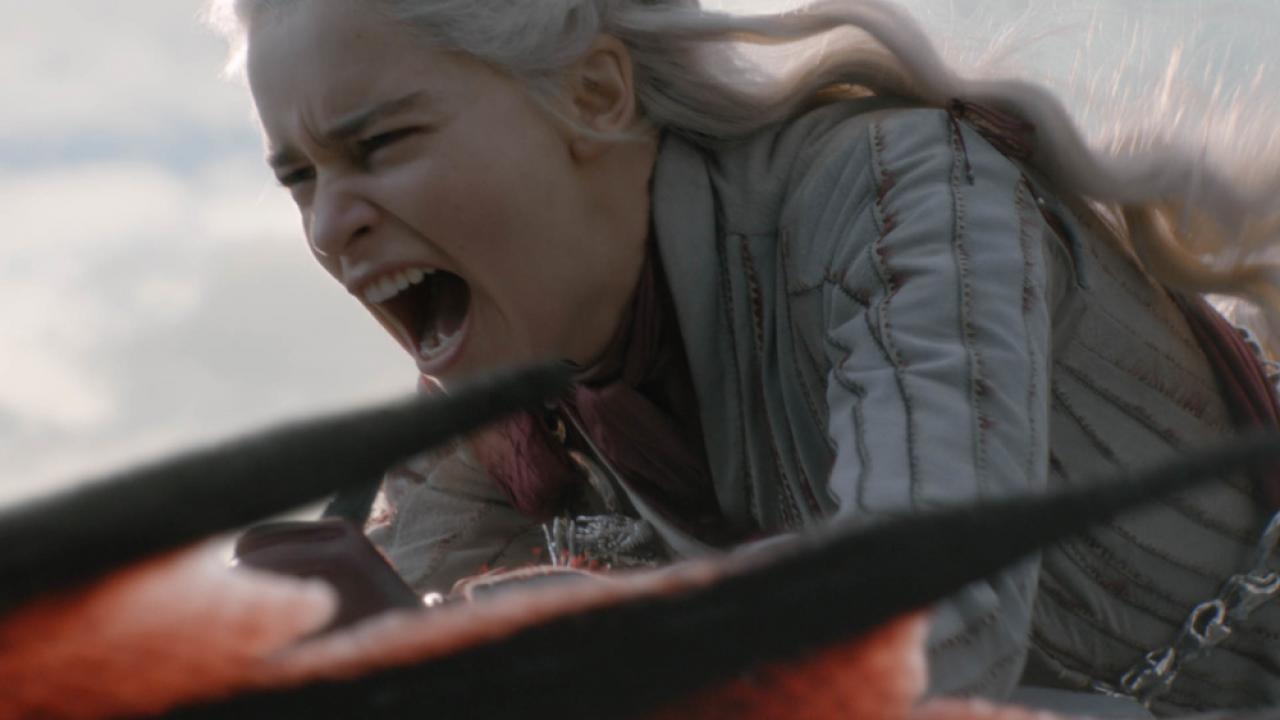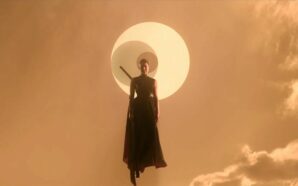For six weeks I’m reviewing every episode of Game of Thrones’ final season exactly one year after they originally aired. Today I’m revisiting the fourth episode of the notorious season, ‘The Last of the Starks’.
‘The Last of the Starks’ is the worst episode of Game of Thrones. It gains that title not only from the quality of its content, but because of its very nature. It’s at least three episodes condensed into one and contains maybe a season’s worth of character development for Daenerys, who begins and ends the episode is very different places, both emotionally and geographically. The episode is used as an interstitial instalment of the show, doing a season’s worth of heavy lifting, racing through the plot, between two big battles in the previous episode and the following. Now, even a bad episode of Game of Thrones is decent television and a lot of the content here is good, although not all of it, but there’s just too much of it and so major decisions and plot points aren’t given adequate time to breathe and feel natural. The series becomes increasingly awkwardly plotted and poorly paced as it races towards its end.
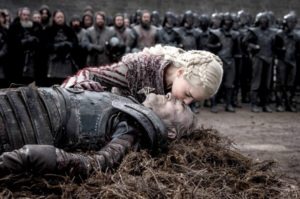 We begin where the previous episode ended: Winterfell. As I discussed last week, the ‘great war’ between the living and the dead, while spectacular, ultimately has little impact and you’d be forgiven for forgetting about it entirely, seemingly like many of the characters. ‘The Last of the Starks’ begins with a mass funeral for the dead and we scan the faces of the recently deceased, reminded that no one of any importance fell during ‘The Long Night’. Jorah’s death is the most meaningful and is the first of many losses Dany will suffer throughout this episode, leading her to embrace the Targaryen fire within.
We begin where the previous episode ended: Winterfell. As I discussed last week, the ‘great war’ between the living and the dead, while spectacular, ultimately has little impact and you’d be forgiven for forgetting about it entirely, seemingly like many of the characters. ‘The Last of the Starks’ begins with a mass funeral for the dead and we scan the faces of the recently deceased, reminded that no one of any importance fell during ‘The Long Night’. Jorah’s death is the most meaningful and is the first of many losses Dany will suffer throughout this episode, leading her to embrace the Targaryen fire within.
Sansa pins a Stark insignia to Theon’s corpse, representing the other family he belongs to and gave his life for, but the rest of the bodies, other than the insignificant Ed, Lyanna and Beric, are faceless CGI extras. While Jon states in his speech that “Everyone in this world owes them a debt that can never be repaid”, the episode sadly doesn’t linger on their sacrifice and the importance of what has occurred, and just 20 minutes into this 70 minute instalment, it’s the setup for the next large conflict that takes centre stage. The fallout of Winterfell’s battle with the dead deserved to be an entire episode but it already begins to feel irrelevant soon after the opening titles play.
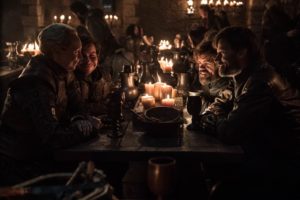 The mass funeral is closely followed by a muted, sombre feast in the main hall which soon becomes rowdier as characters become progressively drunker. It’s amazing how clean and undamaged Winterfell is after warding off the apocalypse but I digress, I love scenes like this. We get to spend time with these characters, seeing the dynamics between them that have taken seasons to build play out. Every sideways glance and smile mean something, now more than ever. I particularly enjoy seeing Sansa interact with the Hound for the first time since the Battle of Blackwater because it highlights just what a wonderful arc she’s had since being Joffrey’s plaything, trapped in the Red Keep, in season 2.
The mass funeral is closely followed by a muted, sombre feast in the main hall which soon becomes rowdier as characters become progressively drunker. It’s amazing how clean and undamaged Winterfell is after warding off the apocalypse but I digress, I love scenes like this. We get to spend time with these characters, seeing the dynamics between them that have taken seasons to build play out. Every sideways glance and smile mean something, now more than ever. I particularly enjoy seeing Sansa interact with the Hound for the first time since the Battle of Blackwater because it highlights just what a wonderful arc she’s had since being Joffrey’s plaything, trapped in the Red Keep, in season 2.
Vitally, we also see Tyrion talk to Bran and learn that the rightful heir to Winterfell and the Stark name doesn’t want such things. In fact, he simply doesn’t want anything anymore. He lives in the past now and relinquishes his titles while Tyrion seeks to break the cycle of death and power the Iron Throne represents. It seems obvious upon rewatch that Tyrion is contemplating nominating Bran to rule the Seven Kingdoms but with it being such a strange idea, and most of the focus on Jon and Daenerys, it played like a huge twist when it happened. But that’s a discussion better left for the review of the finale.
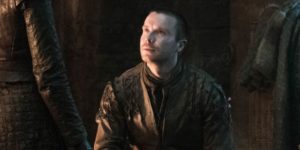 At the banquet, Gendry is granted the Baratheon name and made Lord of Storm’s End, being a bastard no longer, and he proposes to Arya. He’s certainly moving a little quickly but he did come close to death the night before, saved a thin plate of plot armour, so we can cut him a little slack. I like that this forces Arya to have to contemplate the same decision she was did in the first season, when King Robert said to Ned that their two families should unite with a marriage. Just like she said in opening episode of the show, Arya doesn’t want to just marry some Lord and become a Lady, and so she turns Gendry down. Despite the season’s missteps, I continue to love everything with Arya and she’s one of the best served characters in the final six episodes.
At the banquet, Gendry is granted the Baratheon name and made Lord of Storm’s End, being a bastard no longer, and he proposes to Arya. He’s certainly moving a little quickly but he did come close to death the night before, saved a thin plate of plot armour, so we can cut him a little slack. I like that this forces Arya to have to contemplate the same decision she was did in the first season, when King Robert said to Ned that their two families should unite with a marriage. Just like she said in opening episode of the show, Arya doesn’t want to just marry some Lord and become a Lady, and so she turns Gendry down. Despite the season’s missteps, I continue to love everything with Arya and she’s one of the best served characters in the final six episodes.
I only wish they could have explored the repercussions of Arya being the one who killed the Night King. Her reaction is muted and I’d have loved to see her deal with being the subject of some ancient prophecy, and Jon possibly annoyed it wasn’t him who struck the killing blow. I wish they had time to explore this stuff and it’s a big mistake that they don’t. The stunted episode count and desire to wrap the show up so fast is the cause of 90% of the show’s issues. Almost everything problematic stems from this fateful decision.
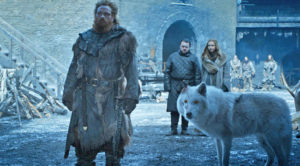 Jon and Dany discuss their shared heritage and she asks him not to tell anyone else about it, which of course he does. It’s a huge decision that has so many knock-on effects but, like everything in the episode, Jon makes it incredibly quickly and the information spreads to eight people by the time the credits roll. Jon’s caught between two worlds; two allegiances; two families. Stark and Targaryen. He wishes he could ride north with Tormund instead of south for Dany, something he eventually does in the finale. It may be controversial but I love that Jon doesn’t say goodbye to Ghost, instead looking at his Direwolf companion and walking away. He’s obviously troubled over this decision and it’s the perfect representation of where Jon’s allegiance currently lies: he chooses a dragon over a wolf. I remember thinking the fan outrage over this was silly when the episode first aired but now it just seems totally preposterous. It’s a great moment.
Jon and Dany discuss their shared heritage and she asks him not to tell anyone else about it, which of course he does. It’s a huge decision that has so many knock-on effects but, like everything in the episode, Jon makes it incredibly quickly and the information spreads to eight people by the time the credits roll. Jon’s caught between two worlds; two allegiances; two families. Stark and Targaryen. He wishes he could ride north with Tormund instead of south for Dany, something he eventually does in the finale. It may be controversial but I love that Jon doesn’t say goodbye to Ghost, instead looking at his Direwolf companion and walking away. He’s obviously troubled over this decision and it’s the perfect representation of where Jon’s allegiance currently lies: he chooses a dragon over a wolf. I remember thinking the fan outrage over this was silly when the episode first aired but now it just seems totally preposterous. It’s a great moment.
Jaime and Brienne spend their time at the celebratory/memorial dinner playing a drinking game and as Brienne returns to her chambers, Jaime follows. As much as I enjoy the rapport between the two characters, I didn’t need their relationship to become romantic in the traditional sense. I think the scene with Jaime knighting Brienne says more about both characters and their relationship than them sleeping together. But I can accept it, unlike what happens next. Later in the episode, Jaime is reminded of Cersei and the army coming to dethrone her and throws away seven and a half seasons of character growth to run back to her side. My first time watching the episode I was convinced that he was riding off to kill his sister because he can only be free when she’s dead. I’m still shocked that in fact he leaves to join her.
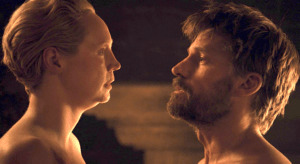 Instead of him holding on to this perverse love despite becoming a good man, adding an extra kink or complication to his character development, it feels like a total disregarding and un-writing of his wonderful arc to this point by having him return to her. Suddenly he can’t forgive himself for his past actions and sees himself as a villain. We need to at least spend some more time with him at Winterfell, struggling with his place in all this, to understand why he would leave. As it stands, he goes from his best self at the start of the episode to his worst self at the end. It took 70 episodes to build Jaime up to this point and just one to devolve him right back to where he started. I hate it and wish he died during the battle last episode, it would have been much more fitting.
Instead of him holding on to this perverse love despite becoming a good man, adding an extra kink or complication to his character development, it feels like a total disregarding and un-writing of his wonderful arc to this point by having him return to her. Suddenly he can’t forgive himself for his past actions and sees himself as a villain. We need to at least spend some more time with him at Winterfell, struggling with his place in all this, to understand why he would leave. As it stands, he goes from his best self at the start of the episode to his worst self at the end. It took 70 episodes to build Jaime up to this point and just one to devolve him right back to where he started. I hate it and wish he died during the battle last episode, it would have been much more fitting.
At Winterfell, Jaime and Tyrion are greeted by an old friend with a crossbow: Bronn. After being given the brothers as a target by Qyburn in the premiere, he finally shows up for another quick scene that marks the middle act of his weird truncated storyline in the final season. He switches sides and forces Tyrion to promise him Highgarden once Daenerys takes the throne before saying, “I’ll find you after the war is done” and leaving. Bronn himself seems to be writing himself out of the main conflict to come, almost as if he realises the show doesn’t have time to feature, much less develop, one more character. However, such a swindle does seem to be in Bronn’s nature and Jerome Flynn is always wonderful in the role. I also like the idea of Bronn wanting to start his own great house, even if he seemingly doesn’t have a surname to pass on. The idea that the originators of all these great houses were once thieves and cutthroats like Bronn is an interesting thought and I’d love to see what ‘House Bronn’ is like in a few hundred years’ time.
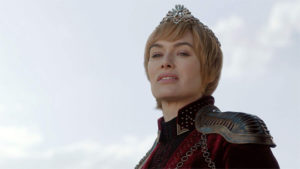 55 minutes into the episode, we finally see Cersei again and I remembered why this is such a bad season for her after being pleasantly surprised by her scenes in the premiere. It’s because she doesn’t really have any scenes after the premiere. The little pieces of exploration into her headspace in that previous episode are all we get and she does nothing of interest at all in this episode. She just stands atop a castle wall, pulling silly evil faces as her dastardly plans occur before her. She’s suddenly the villain of some lesser series; a gurning baddie from a fantasy knockoff with no subtleties or depth. She’s simply ‘The Evil Queen’ now.
55 minutes into the episode, we finally see Cersei again and I remembered why this is such a bad season for her after being pleasantly surprised by her scenes in the premiere. It’s because she doesn’t really have any scenes after the premiere. The little pieces of exploration into her headspace in that previous episode are all we get and she does nothing of interest at all in this episode. She just stands atop a castle wall, pulling silly evil faces as her dastardly plans occur before her. She’s suddenly the villain of some lesser series; a gurning baddie from a fantasy knockoff with no subtleties or depth. She’s simply ‘The Evil Queen’ now.
Cersei lies to Euron and tells him that he’s the father of her unborn child, despite still showing no signs of pregnancy. With the amount of traveling in this episode, like Dany travelling from Winterfell to Dragonstone to King’s Landing, after Jaime already rode from King’s Landing to Winterfell while Cersei was pregnant, it has to take place over many, many months. Now that the show is so condensed and rushed, characters seemingly teleport without other storylines being affected by the advancement of time. The different locations and storylines feel out of sync because of it, as if just days have passed in one but months in another, despite that not being the case.
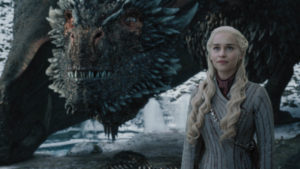 But I’ve been putting off talking about it for long enough, this is Daenerys’ episode. Not just of the season but maybe the whole series. This is where the final pieces are locked into place as she nears her fiery revenge. It’s just a shame the same story that happens within these 70 minutes couldn’t take place over the course of a whole season, because while the content is good and logical, it’s presented in a way that’s not. So, let’s take a look at the many events in this episode that lead Daenerys from the hero who helped save the Seven Kingdoms at the beginning to the birth of the villain we see at the end:
But I’ve been putting off talking about it for long enough, this is Daenerys’ episode. Not just of the season but maybe the whole series. This is where the final pieces are locked into place as she nears her fiery revenge. It’s just a shame the same story that happens within these 70 minutes couldn’t take place over the course of a whole season, because while the content is good and logical, it’s presented in a way that’s not. So, let’s take a look at the many events in this episode that lead Daenerys from the hero who helped save the Seven Kingdoms at the beginning to the birth of the villain we see at the end:
- She returns to playing the political game immediately after the battle, making Gendry the Lord of Storm’s End, which is a move that’s incredibly transparent to Sansa who becomes more antagonistic towards her.
- Jorah is dead and she feels isolated without her oldest friend and confidant.
- She’s left alone at the banquet, watching on while Jon is cheered as a king by the Northerners and Tyrion drinks with his brother.
- Half her army is gone and she has to rely on the North for her forces. They initially refuse to ride south until they have recovered, angering her.
- Jon backs away when she tries to find comfort with him. He struggles with their relationship and she begins to see him as a threat to her birthright.
- Jon betrays her and tells his sisters about his heritage.
- Tyrion and Varys plot treason against her, seeing Jon as having the better claim to the throne.
- One of her two remaining dragons, which she sees as children, is brutally murdered in front of her.
- Missandei is captured by Euron (somehow).
- She is made to travel to King’s Landing without her northern forces and has to embarrassingly stand with her small army in front of the imposing city wall.
- Cersei ignores her calls for surrender.
- Missandei is killed after uttering her final word: “Dracarys”.
This is all good stuff, as we see her come so close to losing everything she’s gained. That ultimate prize of the Iron Throne frustratingly out of reach after she’s done so much to acquire it. All that she has left is what she perceives as her destiny, and she sees the only way to achieve it is by honouring Missandei’s final utterance, becoming a true dragon. That final shot of her face as she walks away from King’s Landing, a new plan of vengeance forming in her mind, is fantastic. The only problem is that all this happens in a single episode.
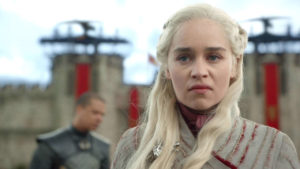 I can see Dany getting to the place where she’ll commit the actions she does in the next episode, the controversial ‘The Bells’. To a degree, the series has been setting up Dany’s heel turn into the mad queen for some time. The fire within has burst through her soft and beautiful exterior several times before. She’s killed Khals, crucified masters in Meereen and only managed to create peace in Slaver’s Bay – her trial run for ruling Westeros – by burning all her enemies alive with a barrage of dragon fire. To say her villainousness is born here, at the gates of King’s Landing, is disingenuous.
I can see Dany getting to the place where she’ll commit the actions she does in the next episode, the controversial ‘The Bells’. To a degree, the series has been setting up Dany’s heel turn into the mad queen for some time. The fire within has burst through her soft and beautiful exterior several times before. She’s killed Khals, crucified masters in Meereen and only managed to create peace in Slaver’s Bay – her trial run for ruling Westeros – by burning all her enemies alive with a barrage of dragon fire. To say her villainousness is born here, at the gates of King’s Landing, is disingenuous.
The problem is that all of these final pieces are locked into place in just one episode when it should have been a season-long storyline. It all happens far too quickly, so even though her reaction makes sense for her character overall, it feels like it doesn’t. They set it up so brilliantly for seasons and then stumble at the very end, rushing to get her to a place she would reach naturally with just a few more hours of character development and seeing these huge events impact her. We have to spend time with Daenerys at this point of her journey, fully exploring this emotional state she’s in, for it to feel right, no matter how much logical sense it might make.
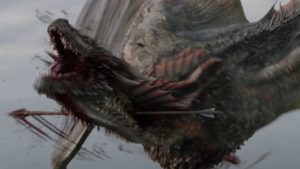 Her rapid arc in the episode may be problematic as a whole but so too are some of these listed events that bring her closer to her Targaryen destiny, the most prominent being the death of her dragon Rheaghal. It’s a shocking moment when a scorpion bolt comes out of nowhere to pierce his neck, especially with the pained cries as it falls and the huge amounts of blood it spits up instead of fire as it cascades towards the water. It’s an event that needed to happen to push Dany to her breaking point but the execution is poor.
Her rapid arc in the episode may be problematic as a whole but so too are some of these listed events that bring her closer to her Targaryen destiny, the most prominent being the death of her dragon Rheaghal. It’s a shocking moment when a scorpion bolt comes out of nowhere to pierce his neck, especially with the pained cries as it falls and the huge amounts of blood it spits up instead of fire as it cascades towards the water. It’s an event that needed to happen to push Dany to her breaking point but the execution is poor.
Euron and his entire fleet of ships really just came out of nowhere, unseen by Dany and her dragons flying high above them? She dive-bombs the fleet but backs off when their bolts come close to hitting her, and Euron, after nabbing Missandei, sails off back to King’s Landing. Daenerys could have easily flown around to the rear of the boats as they sailed through the tight pass between the mainland and Dragonstone, killing them all, something she does next episode. Sure, she’s emotionally distraught and not thinking straight after seeing her child die but it’s executed so awkwardly. Why not have Drogon get hit too, non-fatally, and have to land away from the enemy fleet? That would make perfect sense.
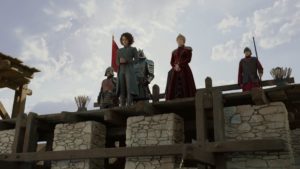 ‘The Last of the Starks’ is an episode where, quite simply, too much happens. Therefore, major events and character decisions aren’t fully explored or explained; the potential for narrative intrigue dashed by a fast-moving plot and the foolish desire to wrap the story up before its time. The plot happens without the appropriate weight and meaning, making plot points that make sense (other than Jaime’s) come across as ill-thought-out. The content of the episode is mostly good, some of it very good, but there’s enough for at least three episodes, if not more, and the series’ pacing is hugely problematic. After years of slow development, suddenly having these things happen so fast betrays some characters and just damages the fabric of the storytelling. But hey, that scene where Tyrion jumps off the boat is pretty cool, right?
‘The Last of the Starks’ is an episode where, quite simply, too much happens. Therefore, major events and character decisions aren’t fully explored or explained; the potential for narrative intrigue dashed by a fast-moving plot and the foolish desire to wrap the story up before its time. The plot happens without the appropriate weight and meaning, making plot points that make sense (other than Jaime’s) come across as ill-thought-out. The content of the episode is mostly good, some of it very good, but there’s enough for at least three episodes, if not more, and the series’ pacing is hugely problematic. After years of slow development, suddenly having these things happen so fast betrays some characters and just damages the fabric of the storytelling. But hey, that scene where Tyrion jumps off the boat is pretty cool, right?
Do you think ‘The Last of the Starks’ is the worst episode of Game of Thrones? If not, what is? Let me know in the comments and be sure to geek out with me about TV, movies and video-games on Twitter @kylebrrtt. Join me next week when, exactly one year after its first airing, I revisit the fifth episode of the final season, ‘The Bells’, which might be the most controversial episode in the show’s history.




